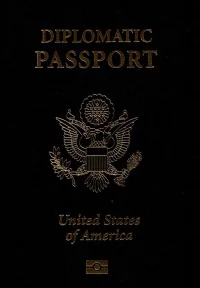
For the uninitiated, one of the apparent perks of being a diplomat is diplomatic immunity — You’ll never have to pay a parking ticket again and you can get yourself out of all sorts of hairy situations in foreign countries by flashing your dip passport like some Get Out of Jail Free card. That’s the impression, in any case. The reality is quite different, especially for Western diplomats who generally want to be seen as responsible guests and good neighbors and certainly do not want to become an irritant in bilateral relations.
But of course, there are major exceptions. There have been several examples, often widely publicized, of diplomats racking up thousands of dollars in parking tickets (we’re looking at you, Russia), driving carelessly, or committing crimes and claiming diplomatic immunity to get out of it. Not surprisingly, these stories have contributed to strong negative feelings towards the concept of diplomatic immunity with the general public.
Lawrence Dunham worked as the Diplomatic and Consular Liaison in the Office of Foreign Mission in the State Department from 1983-2001. He then served as the Assistant Chief of Protocol from 2001-2005. In his interview, he shares more about his role in handling diplomatic immunity and shares cases of bad behavior during his time with the State Department. Some of the more noteworthy was the case of the Georgian diplomat who was driving under the influence when he hit and killed someone in Washington, DC; the grandson of the Brazilian ambassador who had shot someone in a bar; and a Belgian who had killed two people he had met in gay bars in Florida. He was interviewed by Charles Stuart Kennedy beginning July 2007.
Helen Weinland, who served as the Zimbabwe Desk Officer at the State Department from 1987-1989, recalls the difficult case of a Zimbabwean diplomat posted to the UN who abused one of his children. She was interviewed by Charles Stuart Kennedy beginning February 2009.
You can also read about American diplomats who were declared persona non grata and asked to leave the country (through no fault of their own). Go here to read other examples of Diplomats Behaving Badly.
“We handled a range of issues, including abuses of immunity”

DUNHAM: Initially I was hired temporarily to sit in for the person who was responsible for dealing with diplomatic incidents. That included criminal cases, abuses of diplomatic immunity, nonpayment of bills, landlord tenant disputes, things like that.
Not parking because the Office of Foreign Missions was responsible for that. I should point out, I came to Protocol in ’83. In ’82 the Office of Foreign Missions had been established to handle the privileges that were extended to embassy personnel. When I arrived at State, OFM was just starting to gin up its operations. But that included issuing motor vehicle license plates, titling the cars, issuing tax exemption cards, and dealing with parking violations. We dealt with diplomatic immunity in protocol. We continued to handle that function….
I will tell you of one [case], which for some reason always stood out in my mind, and it happened early on when I got there….[We received] a note which had come in from the Embassy of Austria, where the son of the ambassador had received a notice to register for the Selective Service.
Although there was no draft in effect, they still had a process where young men had to be registered. Of course this is inconsistent with the Vienna Convention on Diplomatic Relations. So it was my job to research the Convention and find the appropriate provision, and to prepare a letter for the Selective Service Administration advising that sons of diplomats can’t be required to register for the draft, and also prepare a note to the embassy informing them that the matter had been taken care of.
The reason that it stands out in my mind is because subsequently that ambassador eventually became the President of Austria. It is one of those little things that sticks with you, probably because it was one of my first diplomatic cases. After that, I became involved with occasional landlord tenant disputes, mediating matters between the parties; cases involving immunity, where a diplomat or family member breaks the law.
In the diplomatic and consular affairs division of protocol, which is where I worked throughout my whole career, we handled a range of issues including abuses of immunity, both civil and criminal. Over the years we were responsible for mediating disputes between landlords and tenants. It came up occasionally with unpaid rent, damaged property, things of that nature.
We also handled unpaid bills and other civil-type cases, where, because of the individual’s immunity, the claimant was precluded from seeking redress in court. In terms of the real estate issues, we had a few over the years, various types.
I remember one of the earliest cases involved a woman wanted to curtail a lease on a house for personal reasons. She had rented a house to a European diplomat. The lease was for a three-year period and she wanted to terminate it after the second year. She apparently had become ill, needed some money, and wanted to sell the house. She had tried to negotiate with the diplomat to leave the premises, and he was adamant that he wouldn’t, so she came to the State Department to see if there was anything we could do to help. I think eventually the diplomat did agree to curtail the lease. However, I don’t think he was very happy that the State Department got involved in the process…
We did have a few over the years where there was damaged property….In some cases, and these were fairly new countries, the particular problem seemed to be that they might not have been familiar with some of the kitchen appliances which were not used according to directions and were damaged.
There were a couple of cases where there was damage to the property. It might have been because families had children or a number of children. Doors for example, pulled off the hinges. There was one case of cigarette burns in the carpets of a home. It appeared that people had parties and folks just dropped their cigarettes on the floor. Sometimes there were cases of improper maintenance.
We had one case which involved a diplomat who was required to maintain the heat in a house at a certain level during the winter to make sure the pipes didn’t freeze. He went off for a two-month period, the heat wasn’t properly regulated, and the pipes froze. We had another case where the yard was supposed to be maintained. There were trees and shrubs that needed to be cared for, and they weren’t and became diseased and died. So there were cases like that….
“He had been drinking; there was no question”

Matters involving motor vehicles were and still are handled by the Office of Foreign Missions. Since the Foreign Missions Act was passed in ’82 (OFM was up and running in about 1984-’85), they have handled responsibility of registering motor vehicles, issuing the license plates and issuing driver’s licenses.
As a result, they also had responsibility for dealing with motor vehicle related infractions which included parking tickets, moving violations and in this case, incidents involving allegations of driving under the influence of alcohol.
Now in this particular case, the diplomat involved was the Deputy Chief of Mission from Georgia [Gueorgui Makharadze] . Apparently the accident occurred late one evening or early in the morning, I think it might have been in the spring or early summer.
The diplomat was driving down Connecticut Avenue. Just as you get to DuPont Circle, you can either go under the circle on Connecticut Avenue, or to your right where there is a short exit ramp which brings you right up into the circle area. He was apparently going very fast. They estimated that he was traveling at about 80 miles an hour. He had been drinking; there is no question. He was intoxicated. He mistakenly got into a lane that took him up into city traffic.
When he came up off Connecticut Avenue into the intersection, there were three or four cars backed up at a stop light. He came up and smashed into the back of that lane of cars with such great impact that he pushed one car forward and actually pushed another one into the air. That car came down upon another car and killed one of the occupants [16-year-old Jovianne Waltrick] and injured another.
There may have been people in other vehicles who were injured as well. So that was the case you are talking about. Now in that instance the diplomat actually had to be brought to the hospital to be treated as well.
The incident was highly publicized. I am sure there were reporters on the scene because it was just so horrific and so graphic. They were taking photos of it. It was reported on the news the next day.
The State Department asked the local police to conduct a thorough investigation of the incident and gather all the information and to provide a report to the State Department. That report was transmitted by the State Department to the prosecutor in the jurisdiction with a request, but for immunity would you bring an action in this case?
If the prosecutor comes back with an affirmative decision, as happened in this case, the State Department requests a waiver of the individual’s immunity so that he or she can be prosecuted locally. Now in this case, as I said I was involved tangentially, but I was aware of what was going on. So a waiver was made to the ambassador, a written waiver was presented to him.
“In that case a waiver of immunity was granted and justice was served”
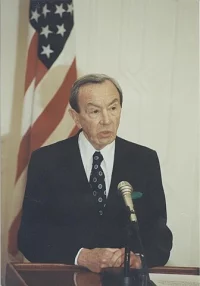
The Government of Georgia took it under advisement. In addition to the formal request which was presented to the ambassador, Secretary [of State Warren, pictured] Christopher called President [Eduard] Shevardnadze and made the request orally to him…
Eventually the Georgians to waive Makharadze’s immunity. He went to court and pled guilty to charges. He was sentenced to something like seven to 21 years in jail. I don’t know whether he was fined also. He started to serve his sentence in the United States. Subsequently, the Georgians acceded to a treaty, or established a treaty, with the U.S. allowing for the exchange of prisoners in U.S. jails to serve their time in their home country.
He was transferred to Georgia and was serving time in jail there. I don’t know whether he is out or not. In that case a waiver of immunity was granted and justice was served. [He was sentenced to seven to 21 years in prison, with a chance of parole after 7 years. He spent three years of his sentence in a North Carolina prison and was then transferred back to Georgia. He was released after three years, once he returned to Georgia.]
In addition, in accordance with the Foreign Missions Act, all diplomats are required to have motor vehicle insurance, and he had motor vehicle insurance. I am not certain what happened on the civil side, but I am sure that an arrangement was made with the family of the girl who was killed, and perhaps with others who were injured….
“They blacked out the record”
Going to abuses of immunity, I think there were probably three or four interesting cases. Until I arrived there, there was an informal procedure for dealing with abuses of immunity, both civil and criminal cases.…On the criminal side, something similar happened we would rely on the police to bring matters to our attention.
We would receive a report and call the ambassador or a senior official from the embassy in and deal with it. In about 1984, or so, there were a couple of very highly publicized cases involving abuses of immunity….
You might have heard about it. The grandson [Antonio F. Azeredo da Silveira Jr.] of the Brazilian ambassador at the time was involved in the shooting at a nightclub, a sort of gentleman’s nightclub, in DC. He shot the bouncer at the nightclub and hit him in the shoulder.
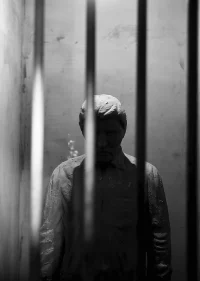
The victim’s name was Kenny Skeen. That case became highly publicized because the police brought the son to the police station and booked him. Then they found out that he was a diplomatic dependent and that he had diplomatic immunity. They blacked out the record. This made the press because the bouncer went to the media and complained about it.
Before the State Department could intervene, the dependent was removed from the country and sent back to Brazil. Through a process of negotiation, the State Department was able to secure an ex gratia payment, a certain amount of money for the bouncer, where the government of Brazil or the family made a payment to the victim to cover medical expenses, lost earnings and pain and suffering. He received a payment in connection with this incident.
Because the dependent was never prosecuted because of his immunity, and perhaps partly because of the way the case was handled, there was a tremendous hue and cry about “diplomatic immunity”…
“You know I am the guy you are looking for. I want to turn myself in.”
Subsequently there were a couple of big cases that came up which were handled in accordance with the FAM [Foreign Affairs Manual] guidelines. We had one case where a fellow [Rudy Van Den Borre] who was a staff-level member at a European embassy, entitled to criminal immunity, took a gun from the embassy. He went down to Florida by bus. He got down there, and he went to gay bars. These were bars where homosexuals hung out.
On two successive evenings he went to a bar and he picked up somebody, and he went to the beach with them and shot them. It was quite frightening. The Florida police (I think this was in Fort Lauderdale) were very concerned because they thought they had a serial killer on their hands. [He was from] Belgium.…Of course the police were on the lookout for this person. Within the gay community in the area there were warnings.
Then out of the blue, early one morning this fellow approached two police officers in a patrol car. It was about 1:00 in the morning. He approached the officers who were just sitting in a parked police car and he said, “You know, I am the guy you are looking for. I want to turn myself in.”
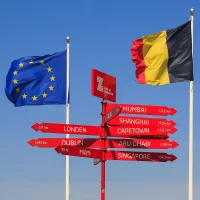
The officers took him to the station, and started to book him. As identification, he showed them an ID card issued by the State Department that said he had diplomatic immunity.
At that point, they called our duty officer. Protocol has a 24-hour duty officer who is available to handle inquiries from the police in cases like this. The duty officer called me at home and got me out of bed, saying, “Larry, the police in Florida have a man who has just confessed to committing two murders. He has diplomatic immunity. What do we do?”
The Vienna Convention is quite clear that even though people may have immunity, if they appear to be a threat to themselves or others, or there is a chance that they might commit the crime again, they can be held pending a determination as to how to handle the matter. In this case the man actually had told police he was prepared to go out and kill others, I had no problem telling them they could hold him until we could determine what to do with him.
I went to work early the next day and called the [Belgian] embassy as soon as it opened. I spoke with my counterpart, explained what happened, and said, “You know we really need a waiver of his immunity so that the police can continue to hold him.” Within a very short period of time (we did have to prepare a written request), the Belgian government waived his immunity. It was done before COB [close of business] that day.
The police were able to hold him temporarily. Over the next day or so we were able to negotiate a complete waiver of his immunity so that he could be prosecuted in Florida. The sticking point for the Belgians was the fact that Florida still applied the death penalty in some cases. They had recently executed people.
The Belgians didn’t enforce the death penalty any longer. Their concern was if immunity were waived, that he would be put to death. So the lawyers at the State Department got in touch with the prosecutors in Florida. After the prosecutor determined that he wouldn’t ask for the death penalty, the Belgians waived immunity. The fellow was prosecuted and convicted and he is in jail now….
“You cannot hold these children. Their father is a Zimbabwean diplomat”
Helen Weinland, Zimbabwe Desk Officer, 1987-89
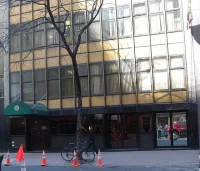
WEINLAND: Another was even worse; I think this next one went on for about six months. It had to do with a diplomat [Floyd Karamba] who was assigned to the United Nations in a fairly mid-ranking role, First Secretary at their UN mission, who lived somewhere in Queens I think.
His son went to school in Queens and claimed to his teacher that he had been beaten by his father and strung up by the wrists to some pipes in the basement of their house.
He apparently showed some marks on his body. By then all these regulations had started to come into effect, whereby if the school heard such a story, they immediately sent the Social Services around.
The Social Services and the police arrived on the doorstep of the UN diplomat and took all three of his children into custody before anyone from the UN could say, “You can’t do that, they have diplomatic immunity.”
So we now had three small, Zimbabwean children in the custody of Social Services of the city of New York and an enraged Zimbabwean Mission to the UN, a President of Zimbabwe who was beside himself.
We kept trying to say to the police “You can’t do this,” and they said they had to, not the police but the Social Services. “You cannot hold these children. Their father is a Zimbabwean diplomat.”
It was unbelievable. They did return the two children who did not claim to be abused relatively quickly, like within three or four days, but they placed this young boy, who was the oldest of the children, in some sort of foster arrangement, whether it was an institutional foster arrangement or an actual separate family, I can’t remember.
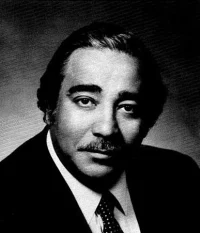
Of course, the newspapers got hold of the thing, so it was all over the press and it was an incredible mess. I can remember having a phone conversation of about 20 or 30 minutes with [pictured, Congressman] Charles Rangel, whose district it was in.
I don’t think I said it but I almost said it: What future does this child have as a foster child, as a black, foster child in New York City as compared with being in his own country as a free citizen? I didn’t say that obviously, but that’s what I was thinking.
By this time we had an NGO, a children’s protection society in Zimbabwe, that was brought into the act and they gave all kinds of assurances that they would supervise the family if the boy were returned to Zimbabwe.
We had PNGed [declared persona non grata] the father, so he was gone and I think also the rest of the family, so only this child was in the United States, all on his own. The Child Protective Society said, “We will supervise the situation here. If the child returns to Zimbabwe, we will keep an eye on it.”
We kept going to Congress and to all the authorities, the Social Services’ authorities, trying to get them to agree that the child should be accompanied back to Zimbabwe and allowed to rejoin his family. Ultimately, we did prevail but as I say, it was about six months of incredible struggle over this kid.
I don’t know, I assume he had been beaten by his father. Whether the child protective people back in Zimbabwe were able to make sure it didn’t happen again, I do not know. We stopped keeping track of it after a while. One can only hope that the kid did OK. I personally believed, and I still believe, we were doing the right thing because I did not think the child had anything like a decent future in the United States under those circumstances. Weighing the two options, I felt it was better for him to go back to Zimbabwe.
